Going old-school: Why COVID-19 baking, sewing and gardening is here to stay
From baking to sewing, gardening and keeping chickens, old-fashioned hobbies are experiencing a revival as we look for comfort in changing times.
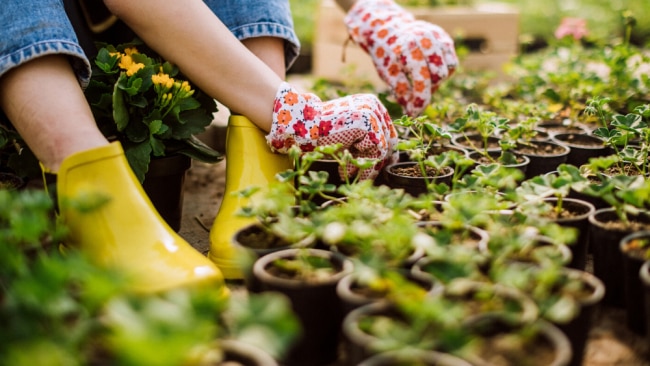
QWeekend
Don't miss out on the headlines from QWeekend. Followed categories will be added to My News.
THERE is a Donna Hay-worthy quiche Lorraine in the oven and a big pot of minestrone bubbling away on the stove when I ring Miranda Porter at her home in Lota on Brisbane’s bayside. We’ve barely exchanged greetings when she gently calls out to her eldest daughter, “Not yet Ruby, it needs another five minutes!”
Porter, an in-demand food stylist, photographer and cinematographer, is cooking up a storm during the COVID-19 pandemic, making all sorts of deliciousness for her first recipe book. It’s a personal project, one she hopes will ultimately be a printed volume of family favourites, and her daughters Ruby, 12, and Ivy, 10, are involved in everything from recipe selection to cooking, styling and snapping the final result.
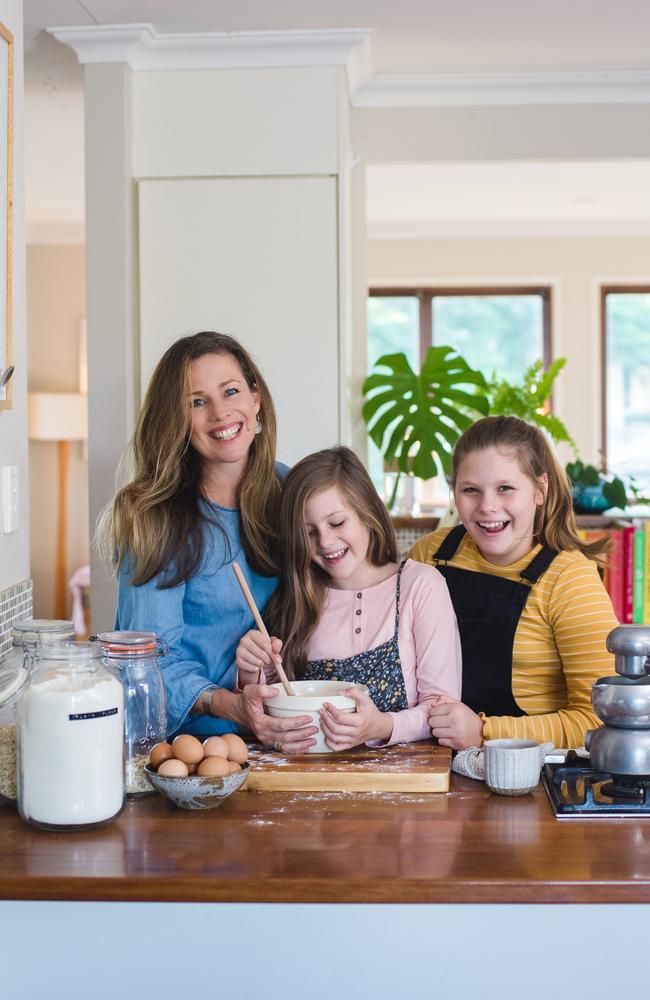
Picture: Miranda Porter
This morning, sous chef Ruby is keeping a watchful eye on that glistening quiche because, you never know, it could well deliver the money shot that makes the cover.
“It’s something that I have been meaning to do for years,” Porter says of the project which has kept her busy, and the children happy, entertained and well-fed during the lockdown and will continue on weekends and holidays when they return to school.
“We are cooking simple, honest food. It’s an eclectic mix of our weeknight favourites. There isn’t anything that is difficult or requires great skill. I’ve had the girls compile a list of their favourite meals; they are essentially steering the direction of the book. I’ll get them to research something like how to form different pasta shapes. They watched a few tutorials on YouTube and are now quite adept at farfalle, gnocchetti, orecchiette.”
Porter’s husband Kim Johr, an IT executive working from home, is staying out of the kitchen, but his Italian mum and German-born father have inspired the girls’ pasta making plus beef rouladen and cherry streusel cake recipes, while Porter looks to her late grandma Myrtle Porter’s handwritten recipes for a taste of nostalgia.
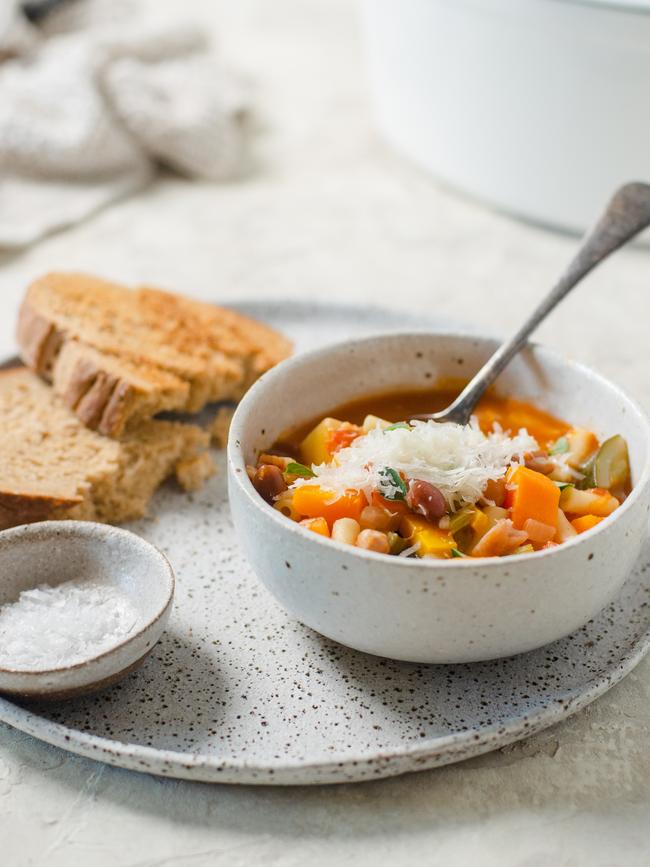
So far the trio has turned out okonomiyaki, smoky baked beans, cauliflower chickpea curry, pork gyoza with ponzu sauce, chicken, leek and mushroom pie and Grandma Porter’s date loaf, to name just a mouth-watering few.
The aim is to shoot one recipe a day and mostly savoury dishes “otherwise we’ll need insulin”. “We don’t have a strict plan or structure – we cook every day and we are trying to photograph a meal every day or every second day, without any pressure. I don’t want to take the fun out of it,” Porter says.
“One of the great things about being at home during this lockdown is having the time to prepare the food. The smells that permeate the house throughout the day naturally entice their little appetites.”
Everything is made from scratch, just as Myrtle Porter would have done in her kitchen in Pittsworth, 40km south-west of Toowoomba, where Miranda grew up with her parents and two sisters in a house across the road. She recalls Myrtle whipping up wonderful meals with her circa-1940s enamel oven, often using spoils from her vegie patch out the back.
“She was an amazing cook and that’s probably where my love of cooking came from. She was always baking but she was a sensible baker. She went through the Depression, was very frugal but used to win at the Pittsworth Show for her shortbread, special meringues sprinkled with hundreds and thousands, and her famous passionfruit cream sponge cake that she’d make weekly for the hospital street stall.”
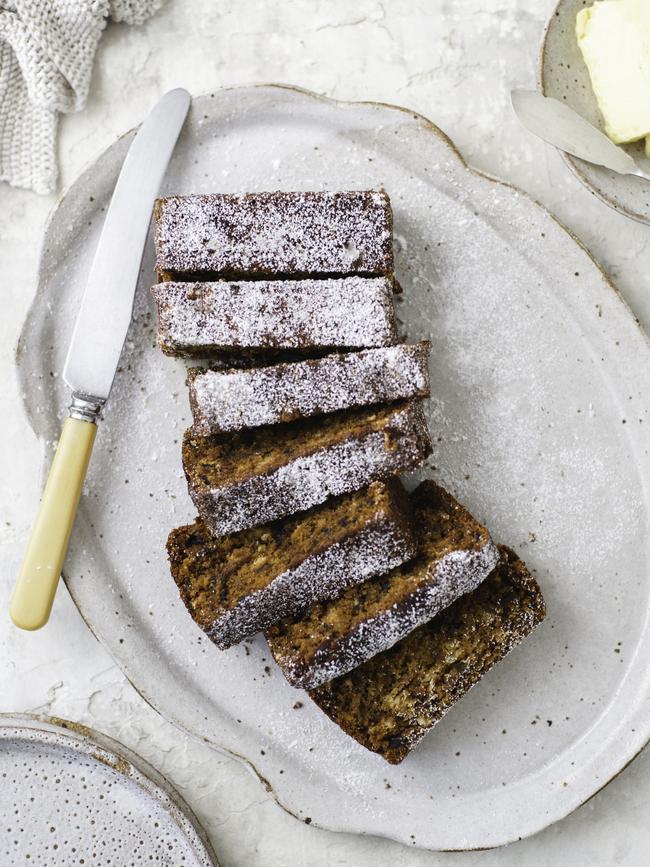
Of course, baking one’s way through a crisis is nothing new and it seems COVID-19 is bringing out the Betty Crocker in all of us if the flour-bereft shelves at Coles and Woolies are anything to go by. Pandemic baking has spawned a raft of hashtags – #isobaking, #lockdownbaking, #bakingfromscratch – as home cooks from around the world bond over snaps of their loaves, cookies and crumbles. It’s all about staying in, baking in and social distancing.
Other old-school pursuits such as sewing, gardening, board games and jigsaw puzzles are also enjoying a revival as the cabin-fevered seek stimulation in time-honoured traditions.
Psychologist Meghan Gray, director of GrayMind Psychology in Brisbane’s inner north, agrees that such simple pleasures are an ideal antidote to the sudden loss of routine and our interest in them won’t be going away even as we slowly emerge from crisis.
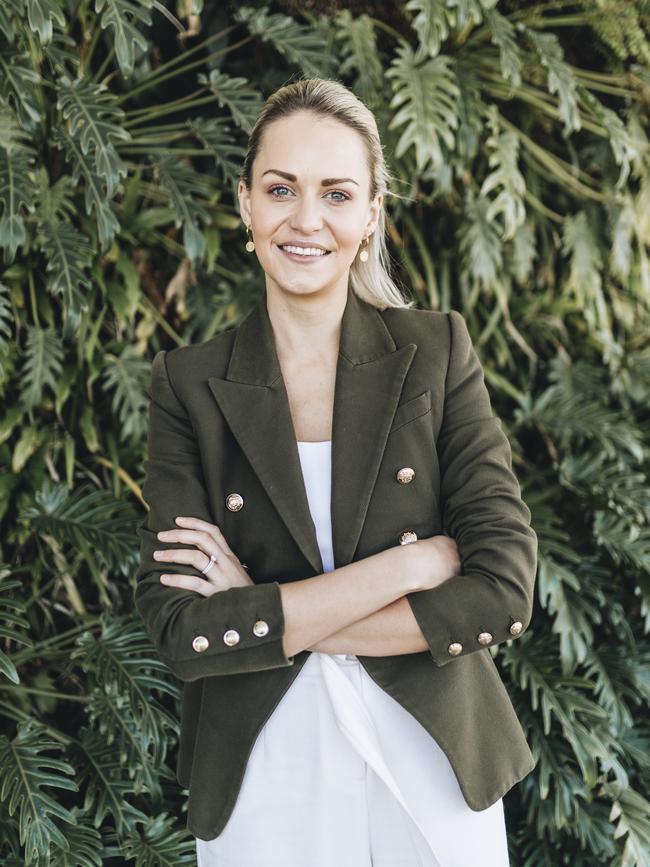
“We tend to psychologically thrive in a structured, purposeful and meaningful environment, so we are all seeking out activities, hobbies or learning a new skill to meet these psychological needs,” she says. “I think activities such as baking or gardening can create a sense of mastery and achievement, and provide pleasure. These can be great ways to look after our wellbeing.”
And they can, quite simply, put a smile on your face.
German photographer Carolin Strothe, who posted a picture of her rather spectacular brownie bundt cake to #BakeCorona on Instagram, puts it thus: “Sometimes it’s necessary to turn off the news and to use your last chocolate for a cake ... After the first bite you forget everything and you’re simply happy.”
Happiness can also come in the form of a chicken, it seems, with Queensland produce suppliers reporting a huge spike in demand for laying hens since COVID-19 restrictions came into play in mid-March. Amid the run on toilet paper, pasta and flour in supermarkets, grow-your-own survival instincts kicked in.
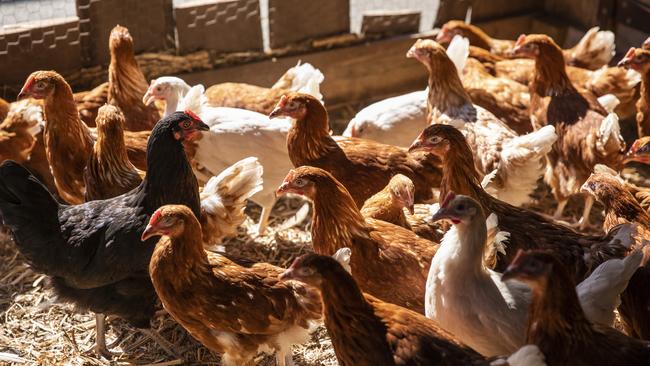
“Everyone came out of the woodwork wanting chickens. Our waiting list was six foolscap pages long, double-sided,” says Nicholas Walls, manager of Capalaba Produce on Brisbane’s southside. “I have been doing this for 24 years and never have I seen such demand and also to the point where people are quite abusive and quite angry.
“We believe we can fill the demand in the next couple of weeks, but the joke is that it’s the worst time of the year to buy poultry because daylight hours are shorter and if [a hen] has not started laying before it gets too cold, they will not lay until spring.”
Walls says most buyers have kept chickens in the past and want to install a new flock or replace older birds. “And there is a percentage who have never had a chicken in their lives and they think, ‘My goodness, I won’t be able to get eggs so I want to get my own!’ For those people who are having chooks for the first time we spend more time with them and give them the right advice about caring for them.”
At Brookfield Produce & Pet on Brisbane’s westside, where laying hens are sold on a first-come, first-served basis, customers have been standing in line for hours before opening time in the hopes of snagging a bird.
“We’ve sold anywhere between 100 and 200 chooks in half an hour,” says operations manager James Cheers. “We are struggling to keep up with demand but we are lucky in the fact that as well as stocking the cheaper, hybrid layers, we also stock a lot of heritage breeds as well. I’ve had Rhode Island reds selling for $85 and people were turning to those in lieu of not being able to get a hybrid layer for about $28.”
After finding herself number “400 and something” on the waiting list for laying hens at Capalaba Produce, Miranda Porter eventually sourced day-old Wyandotte chicks from the Darling Downs Hatchery at Peak Crossing about 20km south of Ipswich.
She and husband Kim acquired their previous flock in 2009 – the chickens came with their house purchase – and had always planned on replacing the birds when they died of old age. The pandemic possibly hastened things.
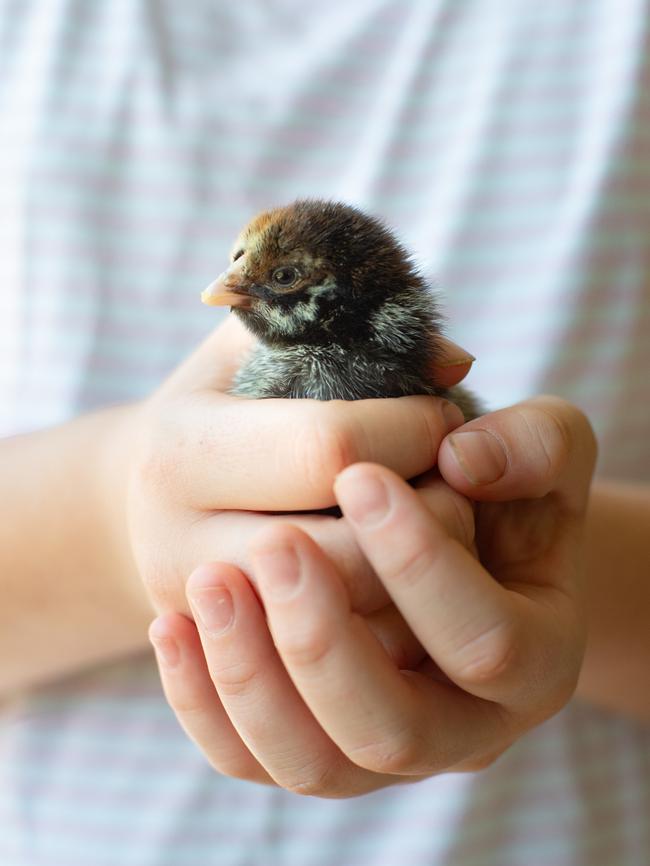
“We’ll have a six- to eight-month wait on the eggs, so maybe it’s not all about self-sufficiency. Mind you, the eggs will definitely come in handy when we finally get them. I find shopping for eggs a little overwhelming – free range, organic, cage, home brand. This way there is no ambiguity over whether my chicken was happy, I know they are loved, they are free range and organic where I can.”
Ruby and Ivy are besotted with the fluffy additions – named Princess Layer, Storm Pooper, Hen Solo, Griffin and Pegasus – who snuggle on the girls’ shoulders when not outside or basking under a heat lamp in the living room.
“Ivy completed her first day of term two home schooling with a chicken on her shoulder. I am having to do pocket checks before we go out on our daily walk.”
While they wait for eggs, Porter and Johr are ramping up on the produce front with a reinvigorated vegie patch, in addition to their existing passionfruit vine, banana, mango and pawpaw trees and a prolific self-seeding cherry tomato bush. The latter makes for a scrumptious sauce served with the family’s homemade pasta.
The Lota couple is far from alone in their efforts to supplement the weekly grocery shop with homegrown produce. Continued anxiety over food supplies is driving unprecedented sales of seeds and seedlings to the point that some suppliers in Australia and New Zealand have paused trading after being overwhelmed with the volume of orders.
“Potting mixture, mulches, compost, fertiliser, seedlings, fruit trees, anything to do with potentially growing food at home has been very big,” confirms Nicholas Walls. “People want to be self-sufficient and many of them are thinking, ‘I’ve always wanted to grow my own so now I’m going to give it a go’.”
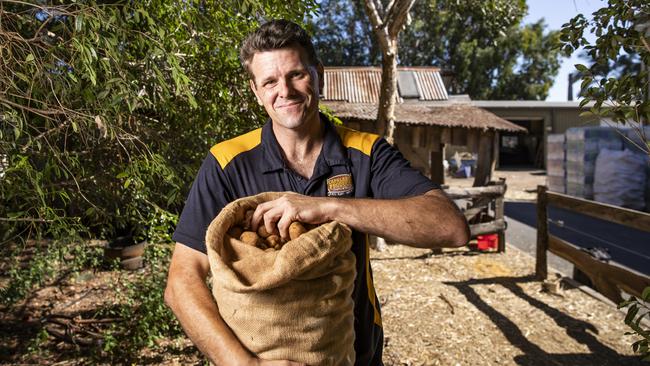
Of course, any enthusiastic green thumb will also tell you of the therapeutic value of gardening, the pleasure that comes from sinking your hands into the dirt and being at one with the earth.
Adrian Higgins, gardening columnist for The Washington Post, says that by attending to the practical aspect of gardening, you are also cultivating your mental health.
“Weeding can have a Zen quality about it, something to do with clearing the soil while emptying the mind,” he wrote in March. “If someone were to say I must self-isolate in the garden for the next few weeks, I would shake him or her by the hand. If I could. Here’s a thumbs up from a distance of six feet or more.”
And while gardeners are wielding an impressive array of Ryobi, Victa and Makita tools outside, inside the home it’s all Singer, Brother and Janome as sewing machines are pulled from hall cupboards, or purchased new, as crafters turn their hands to everything from summer dresses and wrap-style tops to cushion covers and patchwork quilts. I myself have even toyed with the idea of getting my mother’s ancient machine out of mothballs, though I’m not sure I am up to the much-talked-about scramble for fabric at Spotlight.
DIY face masks are also big in sewing circles, despite the jury being out on whether they can actually prevent you from contracting COVID-19, with plenty of how-to tutorials available online. Several YouTube videos even reveal how to convert bra cups into masks – prompting large-busted followers to comment on how their whole face would be swallowed up.
Prior to the pandemic, fashion designer Alice Nightingale ran sewing classes from her boutique in California Lane, in Brisbane’s Fortitude Valley. While her store is now temporarily closed, Nightingale is still selling her handmade pieces online – each one is made from vintage, second-hand or locally-produced fabric – and fielding plenty of questions from novices who are discovering sewing during the pandemic.
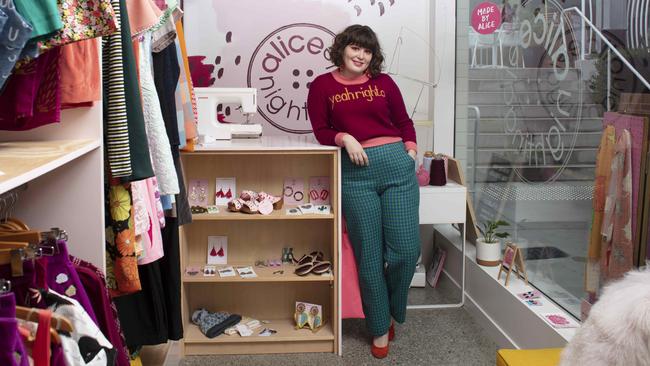
“I’m getting lots of messages asking for advice and help. A lot of my mates live alone and it’s weird for them and they are peak crafting at the moment. I think people are trying to stay busy, avoid boredom and are turning to those long-forgotten crafty projects. It’s nice to see hand sewing and embroidery popping up – it’s a great meditative exercise.”
As a Type 1 diabetic, the sustainable fashion campaigner rarely ventures from the safe confines of her home at Moorooka, in Brisbane’s south, and is using knitting and crochet to make her Netflix binges feel a little more productive. She also has plans to offer free sewing classes via social media, encouraging her audience to source fabric from home or from Facebook “destash” groups selling second-hand fabric, such as Vintage Fabric Destash Australia, rather than buying new.
“If you are teaching people stuff that they have to buy materials for, that is not easy on a budget,” Nightingale says. “And at the end of the day this [pandemic] will be over and that sewing machine you bought on a whim may not have been the best impulse buy.”
“We are really wanting to find ways to activate the ‘soothing system’, that part of us that feels soothed, comforted, cared for ...
I can’t stress this enough,” says clinical psychologist Dr Stan Steindl of Brisbane’s Psychology Consultants, based at Morningside and Newmarket.
Dr Steindl is seeing increases in anxiety, sadness and anger among patients, with many people “really suffering” at this time. He says they are anxious about any number of things: the virus itself; the risk of being infected themselves or passing it along to loved ones; job losses; financial stress; and loss of social connection.
“And of course many people are feeling very angry about it all, the effect it is having on their way of life, and the difficulties associated with feeling stuck or trapped, and then some very difficult behavioural consequences at home can arise out of that.”
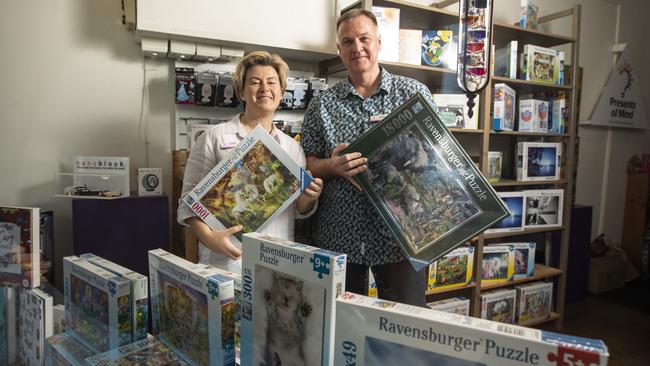
So it comes down to the “soothing system” and how you activate it. And everyone is different. “For me, it is playing my guitar and writing songs,” says Dr Steindl. “For others it might be baking bread. For someone else it might be being outside in the sun with the dog. I would recommend everyone have a think about what is soothing for them, and helps them to feel safe and connected with others.”
For psychologist Meghan Gray, it’s fresh air. “I find nature to be most soothing and comforting to me, so as we can still get outdoors for exercise, I try to take advantage of river walks. I have also had time to get back into reading and I have ordered a home ceramics kit to give learning a new skill a go. I am mainly finding the slower pace very peaceful.”
And for others, it could be as simple as solving a jigsaw puzzle. At Brisbane’s Presents of Mind stores in Fairfield, Paddington and Toowong, puzzles and old-school board games such as Pandemic (in which players must work together to save the world against a pandemic) are flying off the shelves. Owners Kellie and Glenn Lindstrom have kept the doors open during the health crisis, with social distancing in place for staff and customers.
RELATED ARTICLES
Expert tips to make growing vegetables at home easy
Essential gardening advice: how to grow your own herbs
Top Queensland chefs reveal favourite recipes from their childhoods
“There is only so much television or Netflix you can watch. Electronic stuff does your head in because that’s overstimulation,” Kellie Lindstrom says. “When you do a puzzle, that’s the opposite. You are doing something quite calming and peaceful so for people who won’t meditate and won’t do yoga or they can’t go for a walk, that is the next best thing. You switch off, you are just looking at colours and shapes and bringing it all together but your mind is very, very still.”
Softclick Ravensburger puzzles, made in Germany from laser-cut fine particle board, are top sellers (from $35), with the Australian market proving to be a lifeline for the brand.
“Our supplier said that because so much of Europe is locked down, they haven’t been selling much over there, but (continuing to sell) to Australia – they think it’s amazing. There are five container loads on their way over. We are single-handedly keeping the economy of the world’s puzzle companies in business!”
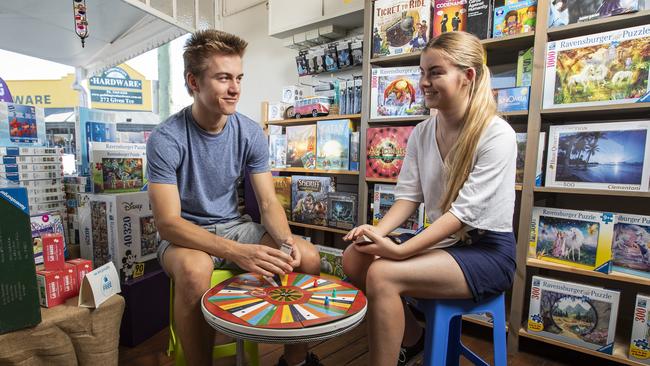
Kellie recommends a 500-piece puzzle for a couple to do over a weekend, at a six-seater table with room to spare, and a 1000-piece if the whole family wants to get in on the act.
“And this is not solid work I’m talking about – it’s doing a little, then toddling off and coming back later.”
When it comes to selecting a puzzle, the general rule is that you should never do a puzzle of a place you have not visited.
“You can only do it if you’ve been there, or if you’ve had your flights cancelled – we’ve had that a lot,” Kellie says with a laugh.
“We’ve had people come in and say, ‘Oh we were going to go to Paris’ so they’re doing a puzzle of the Eiffel Tower.
“That’s really beautiful because it’s a taste of what you were going to see – so we let them have it.”
And she predicts the old-fashioned fun will live on, certainly between non-infected households, with puzzle parties and swaps tipped to be the next big thing.
“And why not? It’s like a great book – why would you not pass on your puzzle to someone else and they can do it and vice versa? It’s passing the love on.”


